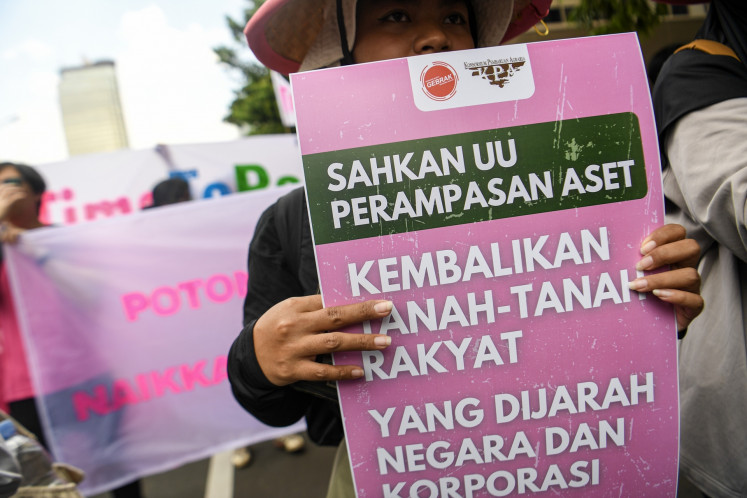Popular Reads
Top Results
Can't find what you're looking for?
View all search resultsPopular Reads
Top Results
Can't find what you're looking for?
View all search resultsRI eyes smaller budget deficit amid rising commodity prices
The Finance Ministry on Thursday unveiled that the 2023 deficit would be between 2.81 and 2.95 percent.
Change text size
Gift Premium Articles
to Anyone
T
he government has announced that the 2023 budget plan will return the deficit to below 3 percent next year, with analysts expecting the path of fiscal consolidation to be rather smooth due to surging commodity prices and a much-recovered economy.
The Finance Ministry on Thursday unveiled that the 2023 deficit would be between 2.81 and 2.95 percent, much lower than the 2022 budget target of 4.85 percent. With this plan, the government expects to cut the deficit by more than 30 percent from last year to between Rp 562.6 trillion (US$39.2 billion) and Rp 596.7 trillion.
The government has projected it will reach the deficit target by increasing state revenue by more than 20 percent to Rp 2.3 quadrillion, while limiting the increase in spending to less than 10 percent, at Rp 2.9 quadrillion, compared with the 2022 budget.
Infrastructure and education spending would see an up to 10 percent increase from the 2022 figure, while health care – not including the COVID-19 budget – could hike up to 40 percent. However, the budget for social aid was set to drop between 19 and 23 percent.
“I think the 2023 budget plan is achievable, as long as commodity prices remain high,” Trimegah Securities chief economist Fakhrul Fulvian told The Jakarta Post on Monday, adding Indonesia had relied on commodities to support economic recovery during the pandemic.
Read also: Lower budget deficit to help Indonesia face global risks in 2022
The government seeks to return the budget deficit to below 3 percent this year to follow the mandate of Law No. 2/2020 on state fiscal policy and system stability for COVID-19 handling, which only permits the government to exceed the budget deficit cap for a maximum of three years. After having excessive deficits in 2020, 2021 and 2022, the deficit cap must return to below 3 percent of GDP in 2023.
The fiscal consolidation comes amid the risk of surging global interest rates, following monetary tightening by Western countries in response to high inflation.
Finance Minister Sri Mulyani Indrawati warned that the global inflation crisis could affect Indonesia and heighten pressure on the country's debt and interest payments. Therefore, she said, reaching a lower deficit was a must, as it was essential to lower the debt issuance as well.
Yet Fakhrul said the government may achieve a 4 percent GDP deficit this year, much lower than the targeted 4.85 percent, given the current high commodity prices. This would mean the path to lowering the deficit back to below 3 percent next year was not too long.
Similarly, the 2021 deficit was 4.65 percent of GDP, much lower than the 5.7 percent target set in the state budget, he said, stressing again the impact of high commodity prices and the recovered economic activities.
He opined that the government may have underestimated its budget projections, arguing that Indonesia’s economy performed much better than anticipated.
Private lender Bank Permata chief economist Josua Pardede also shared a similar view, adding that the 2022 state budget was designed before the war in Ukraine caused shocks in commodity prices and the passing of the new Harmonized Tax Law in November last year, which the government believed would increase the state revenue.
He predicted that the 2022 deficit could come down between 3.8 and 4 percent, paving the way for the 3 percent target for 2023.
Josua added that the 2023 budget was designed with the consideration that the pandemic would be entering into the endemic phase next year, meaning there would be more economic activities next year both from businesses and consumers and implying there could be even more hikes in tax revenue to narrow the deficit.
The transition into the endemic phase would mean removing many of the social mobility restrictions that have been in place for two years, allowing Indonesians to conduct their activities more freely.
“The key also lies in the COVID-19 response, which we are about to shift to endemic. From an economic recovery perspective, it should be positive, and the effect will be felt in tax revenue,” Josua told the Post on Monday.
Read also: World Bank lowers Indonesia’s growth forecast to 5.1%
Sung Eun Jung, senior economist at Singapore-based think tank Oxford Economics warned that things may not turn out as smoothly as expected, arguing that the 2022 deficit could remain high at around 4.5 percent of GDP. This would mean narrowing the deficit to 2.9 percent of GDP next year would require rather ambitious fiscal consolidation.
Despite possible higher revenue this year, up around 11 percent from last year, the commodity boom could also result in higher expenditure, increasing around 10 percent from the same period last year due to higher oil and gas subsidies, the think tank predicted.
“As commodity prices come down next year, we forecast weaker growth in revenues and expenditures. We expect fiscal consolidation next year, but perhaps at a slower pace than the initial state budget for 2023 indicates,” Eun Jung told the Post on Monday.
The think tank projected that Indonesia’s fiscal deficit may reach 3.8 percent of GDP next year, before narrowing even more to 3 percent in 2024, meaning the government may miss its fiscal consolidation target by a year, under certain circumstances.










